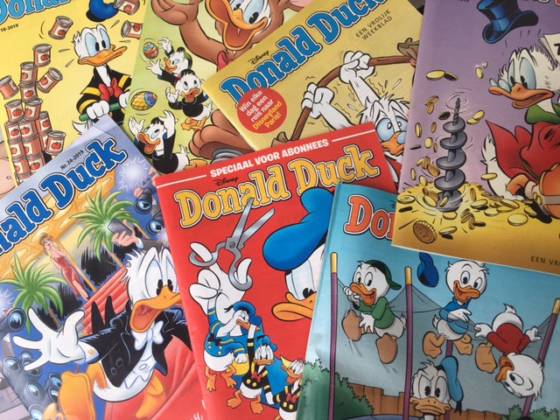Donald Duck is 70 in Dutch duck years and as feisty as ever

 Donald Duck, ‘the happiest weekly in the Netherlands’ is celebrating its 70th birthday and, with a circulation of 200,000 continues to be one of the biggest selling publications in an otherwise declining market.
Donald Duck, ‘the happiest weekly in the Netherlands’ is celebrating its 70th birthday and, with a circulation of 200,000 continues to be one of the biggest selling publications in an otherwise declining market.
The grumpy duck, full name Donald Fauntleroy Duck, started life in 1934 at the Disney studios and was introduced to the Dutch in 1952, making him 70 in Dutch duck years.
His ongoing appeal lies in the fact that Donald is a plodder like everyone else, former editor Joan Lommers, said at the time of his 85th American birthday in 2019.
‘He is middle class, always trying to get ahead but never succeeding, and he’s under his girlfriend’s thumb. But things are always a bit worse for Donald, so perhaps that is a bit of a comfort.’
Donald Duck has always been more popular in the Netherlands and other European countries than in his country of birth, where Mickey Mouse rules the roost, cartoon expert Robin Vinck said. ‘Donald struggles with authority and that makes him a sympathetic character in our eyes. He’s contrary and has a temper, much more interesting than boring conventional Mickey.’
Current editor Ferdi Felderhof says Donald’s anti hero status puts him in line with other popular Dutch children’s books characters like Pietje Bell and Dik Trom. ‘And we love that Donald is always asking oom Dagobert (Scrooge McDuck) for money and never gets any,’ he told RTL Nieuws.
The Netherlands, Italy and Denmark are the only countries where Donald Duck is a weekly and the stories and drawings are no longer subject to Disney’s approval. This editorial freedom may account for the fact that the stories often contain puns and allusions to current affairs that go over the children’s heads but make the magazine attractive to adult readers as well.
The magazine has become more inclusive over the years. In 2019 the magazine included a gay couple after a 10-year-old girl challenged its lack of LGBT characters.
Kwik, Kwek en Kwak (Huey, Dewey and Louie) also have a class mate who is in a wheelchair. ‘A lot of disabled children let us know they appreciated that,’ Felderhof said.
Thank you for donating to DutchNews.nl.
We could not provide the Dutch News service, and keep it free of charge, without the generous support of our readers. Your donations allow us to report on issues you tell us matter, and provide you with a summary of the most important Dutch news each day.
Make a donation